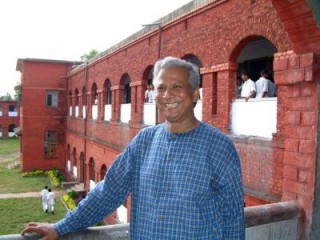
Muhammad Yunus biography
Date of birth : 1940-06-28
Date of death : -
Birthplace : Bathua village, Hathazari, Chittagong, Bangladesh
Nationality : Bangladeshi
Category : Science and Technology
Last modified : 2010-11-15
Credited as : Banker and economist, profesor and author, awarded Nobel Peace Prize (2006)
1 votes so far
Childhood
Yunus was born on 28th June 1940, in Bathua village of Hathazari, Chittagong (then in British India and now in Bangladesh). He was the third child of his father Hazi Dula Mia Shoudagar, a jeweler, and his mother Sofia Khatun. He spent the initial years of his life in Bathua village. It was in 1944 that his family moved to the city of Chittagong, where he started attending Lamabazar Primary School. Active as a Boy Scout, he traveled to West Pakistan, India and even Canada, to attend Jamborees.
Yunus passed his matriculation from Chittagong Collegiate School, with 16th position amongst the 39,000 students in East Pakistan. During his college years, he was active in cultural activities and won awards for drama acting. He completed his BA and MA, in economics, from Dhaka University, in the year 1960 and 1961 respectively. After completing his graduation, Yunus joined the Bureau of Economics as a Research Assistant to the economical researches of Professor Nurul Islam and Rehman Sobhan.
Early Life
In 1961, Yunus was appointed as a lecturer in economics, in Chittagong College. Side by side, he also set up a profitable packaging factory. In 1965, he received a Fulbright scholarship to study in the United States. The year 1969 saw him obtaining his Ph.D. in Economics, from Vanderbilt University, through the graduate program in Economic Development. Thereafter, he was appointed as an Assistant Professor of Economics at Middle Tennessee State University in Murfreesboro, a post he held till 1972.
Yunus founded a citizen's committee in 1971, during the Liberation War of Bangladesh, with other Bangladeshis living in the United States. He also ran the Bangladesh Information Center, to garner support for liberation, and published the Bangladesh Newsletter from his Nashville home. He came back to his country after the end of the war and found an appointment to the government's Planning Commission. Bored with the job, he resigned and joined Chittagong University, as the Head of Economics Department.
Involvement in Social Causes
The famine of 1974 forced Yunus to think about something that would reduce the levels of poverty in his country. First, he established a rural economic program as a research project. He followed this with the development of a Nabajug (New Era) Tebhaga Khamar (three share farm), in 1975. The concept was adopted by the government and renamed as ‘Packaged Input Programme’. Later, Yunus and his associates proposed the Gram Sarkar (the village government) program to the government.
The aim behind the Gram Sarkar was to make the ‘Packaged Input Programme’ more effective. The program was introduced by the then president Ziaur Rahman, in late 1970s. In 2003, the government formed 40,392 village governments (gram sarkars), which were to serve as a fourth layer of the government. However, in 2005, Bangladesh Legal Aids and Services Trust (BLAST) filed a petition against the Gram Sarkars, which were later declared illegal and unconstitutional by the High Court.
Grameen Bank
It was his visit to poorest households in Jobra village that gave Yunus the idea of very small loans to poor people. He made the first small loan, of USD 27.00, from his own pocket. Soon, the concept of creation of an institution, for lending money to the poor, started developing in his mind, finally giving birth to a bank-like institution. In 1976, he succeeded in getting a loan from Janata Bank, for lending to the poor people of Jobra. His institution continued to get loans from other banks and lend it to the poor. By 1982, it had grown to 28,000 members.
It was in 1983 that the Yunus’ institution started operating as a full-fledged bank and was renamed the Grameen Bank (Village Bank). As the popularity of the bank grew, it encountered condemnation from many people, including violent radical leftists and the conservative clergy. In the late 1980s, Grameen Bank started the process of diversifying its interests, which later became separate organizations. For example, the fisheries project became Grameen Motsho (Grameen Fisheries Foundation) and the irrigation project became Grameen Krishi (Grameen Agriculture Foundation).
Today, the Grameen Bank has grown into a mixed group of profitable and non-profit ventures. Its ventures, Grameen Trust and Grameen Fund, run equity projects like Grameen Software Limited, Grameen CyberNet Limited, Grameen Knitwear Limited and Grameen Telecom. Its Village Phone (Polli Phone) Project has brought cell phones to over 260,000 rural poor, in over 50,000 villages. Grameen Banks has always given emphasis to women, to whom more than 90 percent of the loans have been given. Till July 2007, Grameen Bank had lent US$ 6.38 billion to 7.4 million borrowers.
Personal Life
Yunus met Vera Forostenko, a student of Russian literature at Vanderbilt University, in 1967 and got married to her in 1970. The couple had a baby girl Monica Yunus, in 1979. Within a few months of her birth, Vera returned to New Jersey, not finding Bangladesh to be good place to raise a baby, leading to the end of their marriage. Yunus later married Afrozi Yunus, a physics researcher at Manchester University, who was later appointed as a professor of Physics at Jahangirnagar University. They had a daughter Deena Afroz Yunus in 1986 and have been living together till date.
Recognition
* Nobel Peace Prize (2006)
* Ramon Magsaysay Award
* World Food Prize
* Sydney Peace Prize
* Ecuadorian Peace Prize
* 26 Honorary Doctorate Degrees
* 15 Special Awards
* January 14 declared as "Muhammad Yunus Day”, in Houston, Texas
* Named an Ashoka: ‘Innovators for the Public’ Global Academy Member
















